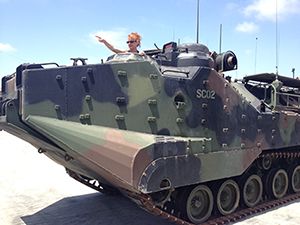Faculty Duo Gung Ho after a Week of Marine Boot Camp
Sept. 2, 2014
 Encumbered by oversized battle fatigues and an unwieldy rifle, Patricia McGuire slogged slowly but surely through the U.S. Marine Corps bayonet assault course at Camp Pendleton.
Encumbered by oversized battle fatigues and an unwieldy rifle, Patricia McGuire slogged slowly but surely through the U.S. Marine Corps bayonet assault course at Camp Pendleton.
Most unnerving was the sound of gunfire that belched from loudspeakers strategically placed along the course, but that too failed to foil the Amarillo College instructor of physical education, who, truth be told, could have selected a more relaxing summer getaway.
Ditto for Dr. James Laughlin, professor of music, who might easily have spent the week of June 16-20 ensconced in less-percussive environs, attuned perhaps to his beloved woodwinds.
But Laughlin and McGuire were agreeably enlisted by the U.S. Marine Corps to spend that particular week immersed in an Educators Workshop in sunny San Diego. The Marine Corps conducts these exclusive seminars quarterly, giving selected high school and college teachers plenty of first-hand knowledge to impart to inquisitive students.
“It was a really cool adventure,” McGuire said. “I got all out of sync on the bayonet course because my fatigues were way too big and the gunfire from the speakers was nerve-racking, but it was a great learning experience.
“Still, it was all I could do to keep that rifle out of the dirt.”
Forty educators were selected from a host of applicants to attend the June workshop. The opportunity for AC’s faculty sprang from an event the AC Wellness Committee sponsored in May called Fitness Combat Challenge. Not only did students get a taste of the rigors of a Marine-style obstacle course, but the Marines who conducted the event did a little recruiting while they were here; they sought a few good teachers willing to endure a modicum of boot-camp discipline and a slew of perception-altering edification about what really makes today’s Marine Corps tick—all expenses paid.
The Marines encouraged McGuire to apply after witnessing her enthusiasm during the Fitness Combat Challenge. They then made a beeline for the Music Building.
“They consider the recruitment of good musicians essential in the military,” Laughlin said. “Music is vital for their pageantry. It’s ceremonial and traditionally enhances the esprit de corps. They actively recruit music teachers to attend these workshops.”
They initially approached (department chair) Dr. Steven Weber, but he had a conflict and passed the paperwork on to Laughlin.
“I jumped at the chance because I’ve had students who expressed interest in military music careers, but I never really understood the audition process,” Laughlin said. “I’m really glad I did this. It was a very valuable, fun and enlightening experience. I had all sorts of questions about the process, and they answered them all.”
The cohort toured several Marine camps in the bay area, where the wide array of career choices in today’s Corps became readily apparent. They enjoyed first-class accommodations and saw plenty of high-tech equipment and fancy gear, but they also received intermittent doses of the draconian boot camp that legend salutes.
For starters, they were delivered by bus to the famed yellow footprints upon which every Marine recruit stands at attention on day one, so they did too. The tongue-lashing that ensued was brief and merely for effect, a poignant reminder that the blueprint for drill sergeant infamy—derision enhanced by rage—is still very much in play.
“He was yelling at us and I was tearing up,” McGuire said. “Not because of my own nervousness … I was thinking of all the kids that have to go through something like this for, oh gosh, like 12 weeks. For us it was only 15 minutes.
“It was a memorable introduction to the Marines, though, and then they told us about a lot of things you don’t see in the movies, all the incredible career and educational opportunities,” she said. “You soon realize that for 18-year-olds who may not know what they want to do, this isn’t a bad choice at all. It certainly doesn’t have to be the last choice.”
The cohort of educators interacted with some recruits in training, even shared their tables for chow. They also got to run the bayonet course, do calisthenics and obstacle courses, and fire M16s at the rifle range (AC’s duo demonstrated exemplary marksmanship).
The teachers’ own “graduation” from boot camp coincided with that of a company of recruits having just completed a capstone event called the Crucible. The celebration was enhanced by some of that spot-on musical pageantry. It was a rewarding, eye-opening week, and the educators emerged from it not only with newfound appreciation for the Corps, but with gratitude for the Corps’ appraisal of teachers in general.
“We heard from several Marines,” Laughlin said, “even from officers, who had tears in their eyes when they told us they owed everything to the teachers in their lives because they’d made such a huge impact on them personally. They hold teachers in the highest regard, possibly more so than any other profession.
“Their respect for educators clearly was heartfelt, and we heard it from all the ranks.”
No way you’d let your rifle scuff dirt after hearing sentiment like that.